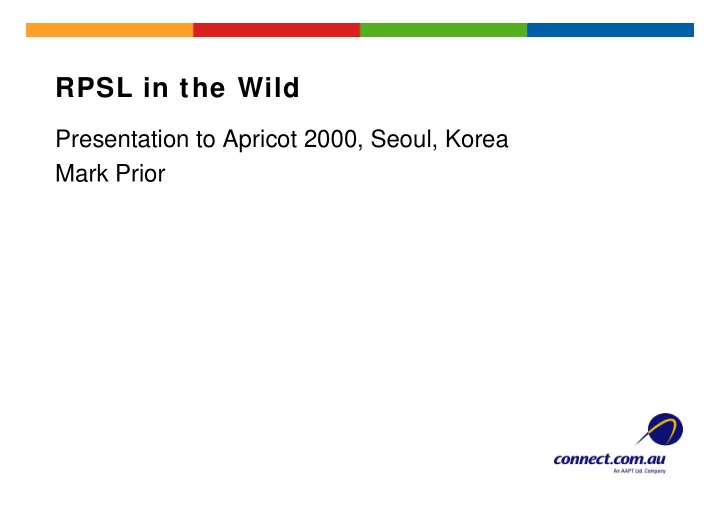

RPSL in the Wild Presentation to Apricot 2000, Seoul, Korea Mark Prior
Agenda • Overview of environment in Australia • Summary of Connect’s routing policy • Why use RPSL? • Examples • Problems
Background • Four major IAPs in Australia – Telstra – UUnet Australia (OzEmail) – connect.com.au – Cable & Wireless Optus • Charge customers for bytes received • Differentiate by source, domestic v’s international (terrestrial or satellite)
Background • Small/Medium ISPs try to minimise their costs for traffic – Multiple providers – Peer at (Australian) regional *IXes – Satellite links (asymmetric flows) • Little BGP experience • Small routers (cisco 2500’s common)
Connect’s Filter Philosophy • Filter routing announcement on import to Connect’s network • Classify route and colour with BGP community • Announce routes based on BGP community
Connect’s Route Import Policy • Don’t trust routing announcements from customers – Filter by prefix – Filter by AS path • Filter peers by AS path only, to avoid nasty accidents • Believe providers will “get it right”
Filter mechanism • On import we classify traffic type with a number of BGP communities; POP location, route type (customer, peer, domestic or international) • Also set local preference so customer announced routes are preferred • Use route type community to determine which prefixes to export
Filter mechanism • Customers can use communities to signal special actions – 2764:1 only export for “cheap” transit – 2764:2 don’t export out of local POP – 2764:3 to 2764:5 alter local preference – 2764:6 tag for domestic transit only – 2764:7 don’t export to non customers – 2764:8 use external satellite not terrestrial – 2764:10 prefer Optus for transit over Telstra
Why use (RPSL) Policy? • Consistent configuration between BGP peers (peers & customers) • Expertise encoded in the tools that generate the policy rather than engineer configuring peering session • Automatic, manageable solution for filter generation
Use of RPSL • Use RtConfig v4 (part of RAToolSet from ISI) to generate filters based on information stored in our routing registry – Avoid filter errors (typos) – Filters consistent with documented policy (need to get policy correct though) – Engineers don’t need to understand filter rules (it just works :-)
Customer Import Policy import: { from AS-ANY action med=0; accept ANY AND NOT { 0.0.0.0/0 }; } refine { from AS-ANY action community.append(2764:65408); pref=25; accept community.contains(2764:3) AND NOT AS2764:RS-PROVIDER^-; from AS-ANY action community.append(2764:65408); pref=15; accept community.contains(2764:4) AND NOT AS2764:RS-PROVIDER^-; from AS-ANY action community.append(2764:65408); pref=5; accept community.contains(2764:5); from AS-ANY action community.append(2764:65408); pref=0; accept ANY; } refine { from AS2764:AS-CUSTOMERS accept PeerAS AND <^PeerAS+$>; from AS2764:AS-TRANSIT accept AS2764:AS-CUSTOMERS:PeerAS AND <^PeerAS+ AS2764:AS-CUSTOMERS:PeerAS+$>; }
RtConfig Configuration Template @RtConfig set cisco_map_first_no = 10 @RtConfig set cisco_map_increment_by = 10 @RtConfig set cisco_prefix_acl_no = 130 @RtConfig set cisco_aspath_acl_no = 130 @RtConfig set cisco_pktfilter_acl_no = 130 @RtConfig set cisco_community_acl_no = 30 @RtConfig set cisco_max_preference = 100 ! router bgp 2764 neighbor 203.63.122.193 remote-as 9313 neighbor 203.63.122.193 description On The Net @RtConfig set cisco_map_name = "AS9313-EXPORT" @RtConfig export AS2764 203.63.80.230 AS9313 203.63.122.193 @RtConfig set cisco_map_name = "AS9313-IMPORT" @RtConfig import AS2764 203.63.80.230 AS9313 203.63.122.193 ! end
cisco Configuration ! access-list 135 – customer routes no ip community-list 34 ! ip community-list 34 permit 2764:5 no ip as-path access-list 130 ! ip as-path access-list 130 permit ^(_9313)+$ route-map AS9313-IMPORT permit 40 ! match as-path 130 no route-map AS9313-IMPORT match community 34 ! match ip address 135 no ip community-list 32 set local-preference 95 ip community-list 32 permit 2764:3 ! ! route-map AS9313-IMPORT permit 50 route-map AS9313-IMPORT permit 20 match as-path 130 match as-path 130 match ip address 135 match community 32 set local-preference 100 match ip address 135 ! set local-preference 75 router bgp 2764 ! neighbor 203.63.122.193 route-map AS9313-IMPORT in no ip community-list 33 ! ip community-list 33 permit 2764:4 end ! route-map AS9313-IMPORT permit 30 match as-path 130 match community 33 match ip address 135 set local-preference 85
Problems? • Policy can easily get very complex and result in even more complex router configuration • Line limit on cisco AS path filters (need to be careful when using as-sets) • ISI/Qwest whois server doesn’t cope with the community format while Merit’s IRRd has problems using AS sets by reference
References • RPSL - RFC 2622 – ftp://munnari.oz.au/rfc/rfc2622.Z • Using RPSL in Practice - RFC 2650 – ftp://munnari.oz.au/rfc/rfc2650.Z • RAToolSet – ftp://ftp.isi.edu/ra/RAToolSet • RPSL Training Page – http://www.isi.edu/ra/rps/training
Contact Details person: Mark R. Prior address: connect.com.au pty ltd C/- AAPT Level 1, 45 Pirie Street Adelaide 5000 South Australia phone: +61 8 8203 2088 fax-no: +61 8 8203 2087 e-mail: mrp@connect.com.au nic-hdl: MP151 changed: mrp@connect.com.au 19980316 source: RADB
Recommend
More recommend